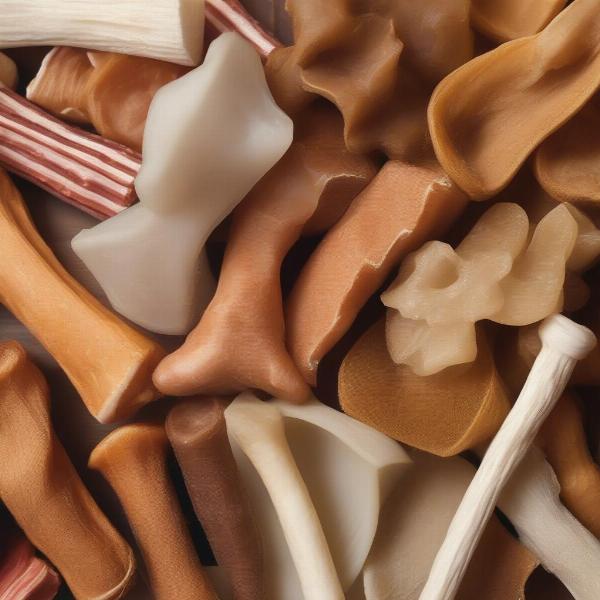Dog chews are more than just a fun pastime for your furry friend; they play a vital role in their overall health and well-being. From teething puppies to senior dogs, a good chew can help with dental hygiene, mental stimulation, and even behavioral management. Choosing the right chew, however, can be overwhelming with the sheer variety available on the market. This guide will help you navigate the world of dog chews, ensuring you select the safest and most beneficial options for your beloved companion.
Types of Dog Chews and Their Benefits
Different dog chews offer various benefits depending on their material and design. Understanding these differences is key to making the right choice.
Natural Chews: Back to Basics
Natural chews, derived from animal sources, are often highly digestible and packed with nutrients. Bully sticks, for example, are a popular choice, providing a good source of protein and helping to clean teeth. Other options like rawhide (always choose high-quality, no-rawhide options) and pig ears can also satisfy a dog’s natural chewing instinct.  Natural Dog Chews: Bully Sticks, Pig Ears, and Rawhide Alternatives
Natural Dog Chews: Bully Sticks, Pig Ears, and Rawhide Alternatives
Dental Chews: Promoting Oral Health
Dental chews are specifically designed to promote oral hygiene. These chews often have ridges and textures that help scrape away plaque and tartar buildup, reducing the risk of gum disease and bad breath. Some dental chews also contain ingredients like chlorhexidine or enzymes to further enhance their cleaning power.
Durable Chews: For Power Chewers
If you have a dog who loves to chew and destroys toys quickly, durable chews are essential. These chews are made from tough materials like nylon or rubber and can withstand even the most enthusiastic chewing sessions.
Edible Chews: A Tasty Treat
Edible chews offer the dual benefit of being both enjoyable and digestible. These chews can be made from various ingredients like dried meat, sweet potato, or other natural sources. They’re a great option for rewarding good behavior or simply providing a satisfying snack.
Choosing the Right Chew: Size and Safety Matters
Selecting the appropriate chew size is crucial for your dog’s safety. A chew that’s too small can pose a choking hazard, while a chew that’s too large can be difficult for your dog to manage. Always choose a chew that’s appropriately sized for your dog’s breed and age.
“Always supervise your dog while they are chewing, regardless of the type of chew,” advises Dr. Emily Carter, DVM. “This will help you monitor for any potential choking hazards or digestive issues.”
Chew Time: Addressing Common Concerns
What if my dog swallows a piece of their chew?
Most chews are designed to be digestible, but it’s always best to supervise your dog while they’re chewing. If your dog does swallow a large piece, monitor them closely for any signs of digestive upset.
How often should I give my dog a chew?
The frequency of chew time depends on your dog’s individual needs and the type of chew. Some chews can be given daily, while others are best reserved for occasional treats.
My dog chews on everything! How can I redirect this behavior?
Providing a variety of appropriate chews can help redirect destructive chewing behavior. You can also try training techniques like positive reinforcement to encourage your dog to chew on their designated toys.
“Redirecting chewing behavior is key,” says Dr. Sarah Miller, Certified Professional Dog Trainer. “Provide a variety of textures and flavors to keep your dog engaged and satisfied.”
Conclusion: Happy Chewing, Happy Dog
Choosing the right dog chew is an important part of responsible pet ownership. By considering your dog’s individual needs, you can provide them with a safe and enjoyable chewing experience that contributes to their overall health and happiness. Remember to always supervise your dog while they’re chewing and consult with your veterinarian if you have any concerns.
FAQs
- What are the best dog chews for puppies? Soft, pliable chews designed for teething are best for puppies.
- Are rawhide chews safe for dogs? Opt for high-quality, no-rawhide chews to avoid potential choking hazards.
- Can dog chews help with anxiety? Chewing can be a calming activity for dogs, helping to relieve stress and anxiety.
- What should I do if my dog doesn’t seem interested in chews? Try offering different types of chews to find one that appeals to your dog’s preferences.
- Are there any chews I should avoid giving my dog? Avoid cooked bones, as they can splinter and cause internal injuries.
- How can I clean my dog’s chews? Some chews can be washed with soap and water. Check the manufacturer’s instructions for specific cleaning guidelines.
- Where can I buy high-quality dog chews? Reputable pet stores and online retailers offer a wide selection of dog chews.
Related Articles:
ILM Dog is your trusted source for expert advice on all aspects of dog care, from breed selection and health to training, nutrition, grooming, and product recommendations. We are dedicated to providing dog owners worldwide with reliable, practical information to help them provide the best possible care for their canine companions. Whether you’re a seasoned dog owner or just starting your journey, ILM Dog offers valuable insights and resources to enhance your dog’s well-being. Contact us for personalized guidance at [email protected] or +44 20-3965-8624. We’re here to help you and your furry friend thrive.